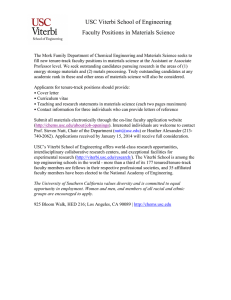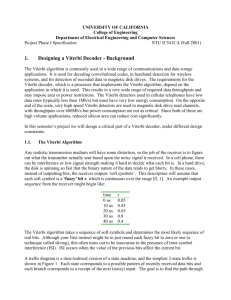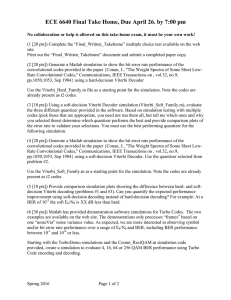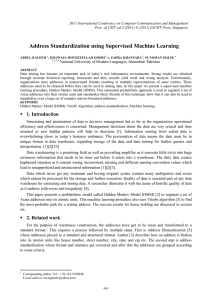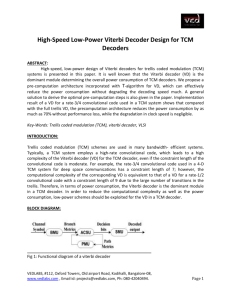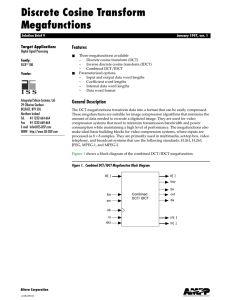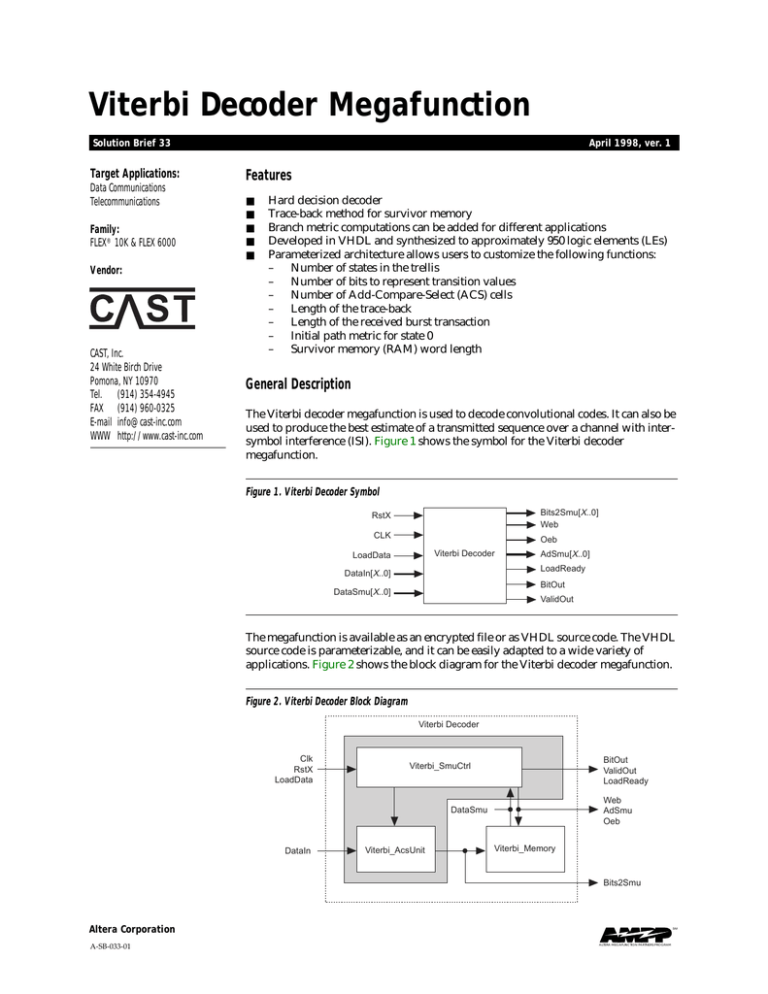
Viterbi Decoder Megafunction
Solution Brief 33
Target Applications:
Data Communications
Telecommunications
Family:
FLEX® 10K & FLEX 6000
Vendor:
CAST, Inc.
24 White Birch Drive
Pomona, NY 10970
Tel. (914) 354-4945
FAX (914) 960-0325
E-mail info@cast-inc.com
WWW http://www.cast-inc.com
April 1998, ver. 1
Features
■
■
■
■
■
Hard decision decoder
Trace-back method for survivor memory
Branch metric computations can be added for different applications
Developed in VHDL and synthesized to approximately 950 logic elements (LEs)
Parameterized architecture allows users to customize the following functions:
–
Number of states in the trellis
–
Number of bits to represent transition values
–
Number of Add-Compare-Select (ACS) cells
–
Length of the trace-back
–
Length of the received burst transaction
–
Initial path metric for state 0
–
Survivor memory (RAM) word length
General Description
The Viterbi decoder megafunction is used to decode convolutional codes. It can also be
used to produce the best estimate of a transmitted sequence over a channel with intersymbol interference (ISI). Figure 1 shows the symbol for the Viterbi decoder
megafunction.
Figure 1. Viterbi Decoder Symbol
Bits2Smu[X..0]
Web
RstX
CLK
Oeb
Viterbi Decoder
LoadData
AdSmu[X..0]
LoadReady
DataIn[X..0]
BitOut
DataSmu[X..0]
ValidOut
The megafunction is available as an encrypted file or as VHDL source code. The VHDL
source code is parameterizable, and it can be easily adapted to a wide variety of
applications. Figure 2 shows the block diagram for the Viterbi decoder megafunction.
Figure 2. Viterbi Decoder Block Diagram
Viterbi Decoder
Clk
RstX
LoadData
BitOut
ValidOut
LoadReady
Viterbi_SmuCtrl
Web
AdSmu
Oeb
DataSmu
DataIn
Viterbi_AcsUnit
Viterbi_Memory
Bits2Smu
Altera Corporation
A-SB-033-01
SM
ALTERA MEGAFUNCTION PARTNERS PROGRAM
ALTERA MEGAFUNCTION PARTNERS PROGRAM
SB 33: Viterbi Decoder Megafunction
Functional Description
The Viterbi decoder megafunction is partitioned into three modules: Viterbi_AcsUnit,
Viterbi_SmuCtrl, and Viterbi_Memory.
Viterbi_AcsUnit Module
The Viterbi_AcsUnit module calculates the path metrics to find the minimum path. The
number of ACS units is parameterizable.
Viterbi_SmuCtrl Module
The Viterbi_SmuCtrl module manages the survivor memory. The state machine
controls the alternate reading of new branch metrics and the trace-back. During
trace-back, the megafunction reads the decision values from memory and outputs the
decoded bits. The megafunction reconstructs the encoder’s actions in reverse order by
updating the state register with a decision value pointed by the former state value. As
a result, the decoded bits are also output in reverse order.
Viterbi_Memory Module
The Viterbi_Memory module is an optional RAM memory that stores the trace-back
values during calculation.
Ports
Table 1 describes the Viterbi decoder megafunction ports.
Table 1. Viterbi Decoder Megafunction Ports
Name
Type
Description
RstX
Input
Asynchronous reset (active low)
Clk
Input
Common clock
LoadData
Input
Enables data loading
DataIn[x..0]
Input
Transition values input; the width depends on the number
of ACS units
DataSmu[x..0]
Input
Input data from external memory
Bits2Smu[x..0]
Output
Output data to external memory
Web
Output
Write enable to external memory
Oeb
Output
Read enable to external memory
AdSmu[x..0]
Output
Address to external memory
LoadReady
Output
Indicates read for data
BitOut
Output
Decoded output bit
ValidOut
Output
Indicates the valid output data
Verification Methods
The megafunction has been extensively tested using various parameter settings. A
special encoder circuit is used as a testbench for full testing.
Ordering Information
The Viterbi decoder megafunction can be purchased directly from CAST, Inc. For an
Altera Hardware Description Language (AHDL) netlist format, designers must supply
parameter settings to CAST, who will create the netlist file. Contact CAST for more
information.
2
Altera Corporation
SB 33: Viterbi Decoder Megafunction
Modifiable Parameters
CAST, Inc. can customize the megafunction with the parameters shown in Table 2.
Table 2. Modifiable Parameters
Parameter
Description
N
Number of states in trellis
NB
Number of bits to represent transition values
ACS
Number of ACS cells
LTB
Length of the trace-back
LRB
Length of the received burst
IP
Initial path metric for state 0
MWL
Survivor memory (RAM) word length
Utilization
Table 3 lists the typical device utilization results for the megafunction.
Table 3. Typical Device Utilization for the Viterbi Decoder Megafunction
Device
Speed
Grade
Utilization
Performance
(fMAX)
Parameter Settings
N = 16, NB = 8, ACS = 4, LTB = 30,
LRB = 5, IP = –4, MWL = 8
LEs
EABs
EPF6016
-2
954
–
17 MHz
EPF10K30A
-1
960
0
31 MHz
Deliverables
The following files are provided with the encrypted license:
■
■
■
■
■
■
Post-synthesis AHDL netlist file
Assignment & Configuration File (.acf)
Symbol File (.sym)
Include File (.inc)
Graphic Design File (.gdf) of test circuit
Vectors for testing the functionality of the megafunction
The following files are provided with the VHDL source license:
■
■
■
■
■
■
■
VHDL RTL source code
Testbench
Example testbench wrapper for post-route simulation
Vectors for testbench
Simulation script
Synthesis script
Expected results for testbench
®
101 Innovation Drive
San Jose, CA 95134
(408) 544-7000
http://www.altera.com
3
Copyright 1998 Altera Corporation. Altera, FLEX, FLEX 10K, FLEX 6000, EPF10K30A, EPF6016, and AMPP are trademarks and/or service
marks of Altera Corporation in the United States and other countries. Other brands or products are trademarks of their respective holders. The
specifications contained herein are subject to change without notice. Altera assumes no responsibility or liability arising out of the application
or use of any information, product, or service described herein except as expressly agreed to in writing by Altera Corporation. Altera customers
are advised to obtain the latest version of device specifications before relying on any published information and before placing orders for
products or services. All rights reserved.
Altera Corporation

